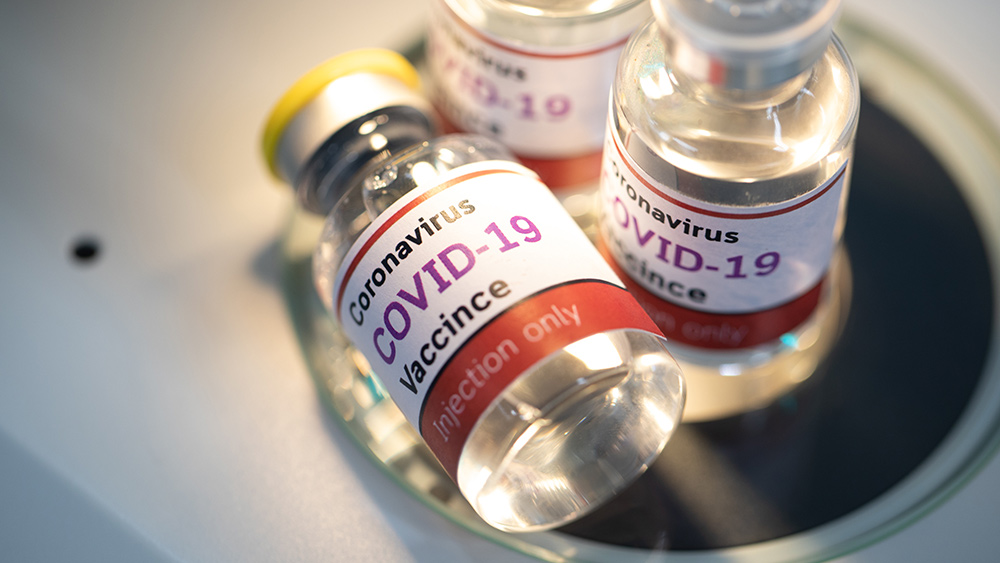German capital now limiting use of AstraZeneca coronavirus vaccine after more blood clots deaths discovered
04/02/2021 / By Ramon Tomey

The German capital of Berlin is now limiting the use of AstraZeneca’s Wuhan coronavirus vaccine to patients over the age of 60. The decision from the Berlin government followed findings by German researchers that the vaccine played a role in the blood clots reported in some patients. AstraZeneca’s vaccine was initially approved for use in the entire country on people under 65 – before Berlin put the new regulation in place.
Berlin State Minister for Health, Care and Equality Dilek Kalayci said the Standing Committee on Vaccination at the Robert Koch Institute (STIKO) and the Paul Ehrlich Institute would make new recommendations regarding the AstraZeneca jab. Robert Koch Institute spokeswoman Susanne Glasmacher confirmed that it is looking at the latest research regarding health risks from the jab.
For now, STIKO has restricted the use of the vaccine only for men and women older than 60.
Kalayci said during a news conference: “We have to wait for the recommendations, but we wanted to take this step as a precaution. The state minister acknowledged that the vaccine “does prevent symptoms,” but stressed the need “to be careful with it nonetheless.” She continued that any pending vaccination appointments using the jab will be canceled.
Furthermore, health ministers from the different regions of Germany tackled issues related to the vaccine in a special Mar. 30 meeting with federal health officials.
On March 19, German scientists at the Greifswald University Hospital led by professor Andreas Greinacher said they discovered the link between blood clots and the AstraZeneca vaccine. The team found that the jab causes blood platelets responsible for clotting to become- over-active and cause blockages in different blood vessels.

Greinacher’s team zoomed in on nine cases of blood clots that occurred from four to 16 days after vaccination. All nine patients were aged 22 to 49 years old, with eight of them being female. Seven patients had clots in blood vessels in the brain, and one had their blood vessels in the lungs blocked. One other patient experienced blood clots in vessels connected to the digestive system and the brain. Based on these observations, they found that the AstraZeneca vaccine “is associated with development of a pro-thrombotic disorder.” (Related: AstraZeneca coronavirus vaccine triggers immune response that can cause fatal blood clots in the brain.)
Other European nations have followed suit in limiting use of the AstraZeneca jab
The German researchers’ findings echoed that of scientists at the Oslo University Hospital in Norway. Speaking to Norwegian newspaper VG, the hospital’s chief physician Dr. Pål André Holme expressed confidence that he and his team had identified antibodies responsible for the blood clots – which the vaccine triggered. The Norwegian scientists looked at three cases of blood clots in the country, all involving health workers below 50 years old.
Holme said: “Our theory [is] that this is a strong immune response that most likely comes after the vaccine. There is no other thing … that can explain this.” The physician elaborated after the newspaper continued pushing: “[No] other history in these patients … can give such as strong immune response. I’m pretty sure it’s these antibodies that’s the cause, and I see no other reason than it’s the vaccine that triggers it.”
Given the findings, a number of European nations have restricted the use of the AstraZeneca vaccine to older cohorts – if not halting its use entirely. Denmark announced it would extend its earlier suspension of the jab for an additional three weeks. Danish authorities added they would give an update on their decision in the middle of April. The Nordic country first reported a number of blood clots in some citizens who got immunized using the jab. Meanwhile, France has also moved to impose age restrictions on people who wish to get vaccinated using the British company’s vaccine. (Related: Two Danes suffer from brain hemorrhage after getting AstraZeneca coronavirus jab.)
Sweden is mulling restrictions on the AstraZeneca jab, making it available only for those above 55 years old. Swedish State Epidemiologist Dr. Anders Tegnell elaborated on the move in an interview with the Swedish newspaper Dagens Nyheter. He explained that young people must weigh the risks of side effects following vaccination and the risks of contracting COVID-19.
“If you are under 50 [to] 55 years old, the risks are very small when it comes to the disease, so then maybe you should think about the risk-benefit balance,” Tegnell remarked.
Visit Pandemic.news to read more news about AstraZeneca’s Wuhan coronavirus vaccine.
Sources include:
Tagged Under: adverse reactions, AstraZeneca, Berlin, Big Pharma, Blood clots, coronavirus, coronavirus vaccine, covid-19, deaths, Germany, pandemic, vaccine antibodies, Vaccine deaths, Vaccine injuries, Wuhan coronavirus




















